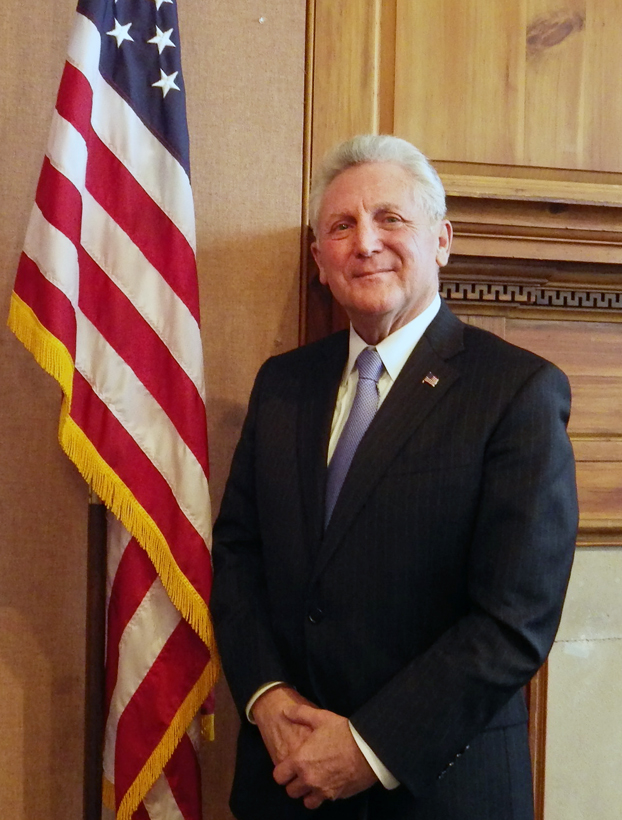 Reproductive Medicine Associates of Connecticut is the state”™s largest fertility center with locations in Norwalk, Danbury, Stamford and Trumbull. It also operates a Hudson Valley office in Poughkeepsie and is planning to open its first Westchester office in the near future.
Reproductive Medicine Associates of Connecticut is the state”™s largest fertility center with locations in Norwalk, Danbury, Stamford and Trumbull. It also operates a Hudson Valley office in Poughkeepsie and is planning to open its first Westchester office in the near future.
In this edition of Suite Talk, Business Journal Senior Enterprise Editor Phil Hall speaks with Robin Mangieri, CEO of Reproductive Medicine Associates of Connecticut, to discuss its distinctive mission and how it achieves it goals.
For the benefit of those who are not familiar with your organization, can you please detail your services?
“We are a fertility practice located throughout Fairfield County that provides individuals and couples with assisted reproductive technologies to help them achieve pregnancy and grow their families. We see between 1,500 to 1,600 new patients a year, and those patients can either just need a consultation or they can go all the way to the most advanced stages where they need embryo screening for genetic diseases, in vitro fertilization or genetic testing.”
How did your organization function during the height of the pandemic? And what are you doing now to encourage the health and safety of your patients while the pandemic continues?
“We did have to close for a period of time because we have to adhere to all of the state and federal guidelines. We did a lot of Zoom follow-up to just make sure patients knew what to expect. And we opened when it was declared safe by both the state and the federal government, we changed a lot of things within the practice.
“Now, any new patient appointment or follow-up or any kind of discussion with our care team is all done remote via Zoom or Teams. The in-person appointments, which tend to be ultrasounds or uterine evaluations or semen analysis, are all done in a very different way, which allows us to space out the patients appropriately to allow for social distancing. Masks are required, temperatures are checked, we have a questionnaire everybody has to fill out and we removed lots and lots of furniture.
“We also have a system in place where the patient arrives, they text us that they’re here. They stay in their car and then we text them when they can come upstairs. When they come up, we handle the triage, which is all different now because of Covid.
“I think the most challenging part for a lot of businesses is that every week the governor puts out a list of the states that are impacted in some of our patients”™ travel, and that”™s impacted some of the care we can provide. It’s limited staff vacation because we know our staff wants to be here for the patient. I would say we have adjusted and that we’re working really hard to still be able to offer the personal touch points remotely that we were able to do in-house. And nobody’s giving us a hard time about sitting in their car waiting for the appointment or having to wear a mask.”
How do you approach the emotional needs of your patients?
“We really try to keep in mind that the people we are helping are our friends and neighbors. These are people that we care about ”“ we are invested in our community and they’re not just patients to us.
“The emotional need we’ve worked hard to achieve over the years is about being open-minded and trying to give patients a lot of options that might help them emotionally. We have support groups that we used to have in-person that we’ve transitioned to online. There’s one called ”˜Ladies Night In,”™ which is a support group that”™s peer-led. And we have online yoga that also used to be in-person. In November, we did this really great event where we worked with a company called The Art of Infertility, and we purchased art kits. Each individual had a canvas and all different paints and supplies, and they we were able to use that to express the joy or pain or frustration or anger that they were going through.
“We also have a health coach that might help with food planning and diet, and we have three acupuncturists, a nutritionist and two social workers. There are many programs available to help meet some of those emotional needs.”
According to your website, one of the services that you provide is LGBT family building. Can you detail what that involves?
“One of our physician partners is an openly gay male and he built his family through surrogacy and egg donation. This helped to magnify for us that there were things that we needed to change in the practice to be much more inclusive.
“There have been lots of subtleties that we have changed over the years to create a very inclusive practice both for gay men and gay women and gay couples. We have a lot of transgender patients who freeze their gametes either before they start hormones or before they go through surgery. And we’ve done open door training through the through the Family Quality Council. We try to make sure that the practice is open and inclusive to all the patients who need our services.”
How expensive are your services and can people pay for this through most health care programs?
“Luckily, Connecticut has a state mandate, so there are a lot of patients that have infertility benefits if their employers are not self-funded. And for those gaps ”“ for either somebody who used up their mandate coverage or who worked for a self-funded company ”“ we’ve created bundled pricing that is discounted for our self-pay patients and we’ve worked with pharmacies to try to see if we can bundle medications.
“I sit on the board of a charity called Nest Egg Foundation that offers financial grants to couples or individuals suffering from primary infertility, which means they don’t have children yet. We give grants that are up to $10,000 that they can use towards IVF treatment if they don’t have insurance. We try to participate with all the insurance companies we can in this region.”
In terms of donor options, do you accept donations of both sperm and eggs for your patients?
“We don’t have a sperm bank, but we work with certain FDA-approved sperm banks where patients can order sperm that is shipped to us. We have our own egg donation program and we use banks as well. We also have a donor embryo program.”
I”™ve heard that you will be opening your first Westchester location soon. Can you offer a preview of where and when this will take place?
“We didn’t sign the lease yet ”“ that’s my next call after this interview. We are planning to open before the end of the year and it”™s probably going to be located in Harrison.”




















